
-
Find the right food for your pet
Take this quiz to see which food may be the best for your furry friend.
Find the right food for your pet
Take this quiz to see which food may be the best for your furry friend.
Featured products
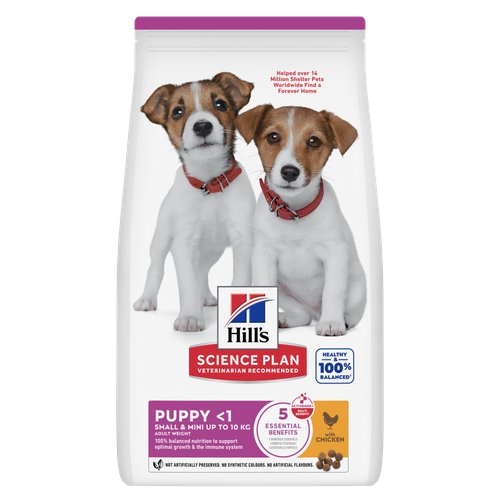 Small & Mini Puppy Dog Food
Small & Mini Puppy Dog FoodHill's Science Plan Puppy Small & Mini Breed Dog Food with Chicken is a complete pet food, specially formulated with ActivBiome+ Multi-Benefit Technology.
100% balanced nutrition to support optimal growth & the immune system.Shop Now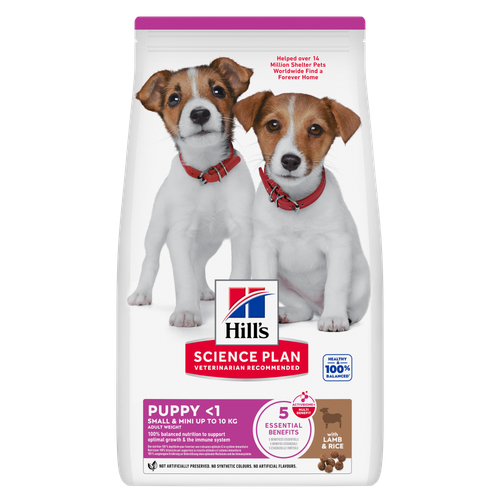 Small & Mini Puppy Food
Small & Mini Puppy FoodHill's Science Plan Puppy Small & Mini Breed Dog Food with Lamb & Rice is a complete pet food, specially formulated with ActivBiome+ Multi-Benefit Technology.
100% balanced nutrition to support optimal growth & the immune system.Shop Now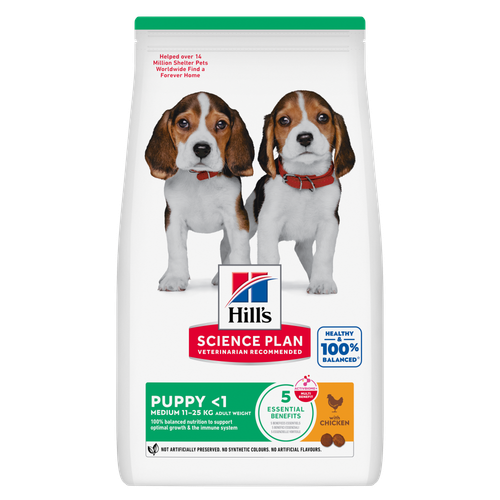 Medium Puppy Food
Medium Puppy FoodHill's Science Plan Puppy Medium Breed Dog Food with Chicken is a complete pet food, specially formulated with ActivBiome+ Multi-Benefit Technology.
100% balanced nutrition to support optimal growth & the immune system.Shop NowFeatured products
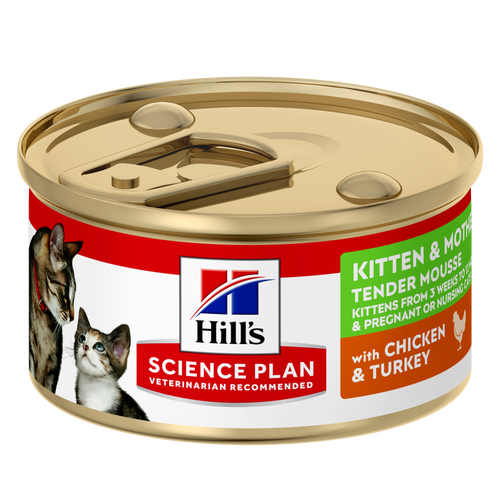 Kitten & Mother Tender Mousse Cat Food
Kitten & Mother Tender Mousse Cat FoodHill's Science Plan Kitten & Mother Tender Mousse Cat Food with Chicken & Turkey is a complete premium pet food for kittens from weaning until 1 year old and for pregnant and nursing cats. Formulated with chicken, turkey and other specially selected ingredients to support gut health and optimal growth. It comes in a soft mousse texture they'll love.
Shop Now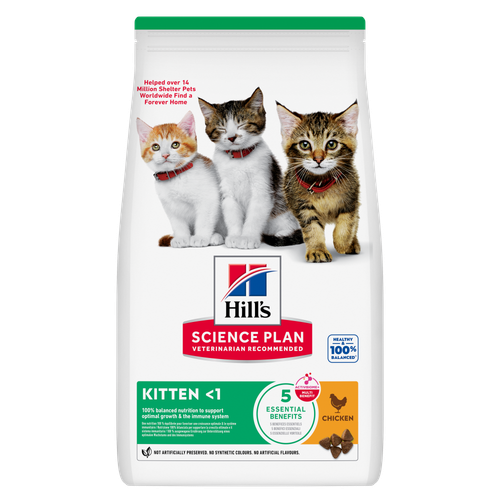 Kitten Food
Kitten FoodHill's Science Plan Sterilised Kitten Cat Food with Chicken is specially formulated with ActivBiome+ Multi-Benefit Technology. This food is carefully formulated for the developmental needs of kittens, so they get the best start in life & grow to their full potential.
Shop Now Hypoallergenic Dry Cat Food
Hypoallergenic Dry Cat FoodHILL'S SCIENCE PLAN Hypoallergenic Adult cat food with egg & insect protein is a complete pet food for adult cat 1–6 years old. It's formulated for cats with delicate skin and stomach, with limited high quality novel protein sources & no grain.
Shop Now -
Dog
- Dog Tips & Articles
-
Health Category
- Weight
- Food & Environmental Sensitivities
- Urinary
- Digestive
- Joint
- Kidney
-
Life Stage
- Puppy Nutrition
- Adult Nutrition
- Senior Nutrition
Cat
- Cat Tips & Articles
-
Health Category
- Weight
- Skin & Food Sensitivities
- Urinary
- Digestive
- Kidney
-
Life Stage
- Kitten Nutrition
- Adult Nutrition
Featured articles
 Pet Supply Storage: 8 Upcycling Crafts for Bags and Cans
Pet Supply Storage: 8 Upcycling Crafts for Bags and CansGet helpful hints and tips on how to creatively upcycle your pet's food bags and cans, helping to reduce waste and give your home some visual flair.
Read More What Cleaning Products Are Safe for Pets?
What Cleaning Products Are Safe for Pets?Learn which cleaning product ingredients can be hazardous for dogs & cats, which alternatives are safer and tips for using cleaning products around pets.
Read MoreTips for Working From Home With a PetGet helpful information on how to get all of your work done while keeping your dog or cat entertained when working from home.
Read More -
Find the right food for your pet
Find the right food for your pet


Diabetes in dogs occurs when their bodies fail to perform their most essential function — converting food into energy. And, unfortunately, canine diabetes is on the rise. In fact, Banfield Pet Hospital reports that cases of the disease increased by nearly 80% from 2006 to 2015.
Ninety-nine percent of dogs with diabetes have diabetes mellitus, often called sugar diabetes, according to Dr. Etienne Cote, a veterinarian and the author of "Clinical Veterinary Advisor." Dogs can either have Type 1 diabetes mellitus — which is more common among dogs and similar to the type of diabetes seen in children — or Type 2 diabetes mellitus.
Causes of Canine Diabetes
When a dog has diabetes mellitus, the cells that produce insulin are destroyed, leaving the dog unable to properly regulate blood sugar. It's believed that inflammation of the pancreas, a small organ near the stomach that produces insulin, plays a part in causing dog diabetes.
While it's not clear what exactly causes a dog's endocrine system to go haywire and stop regulating blood sugar, there are some known risk factors for the disease: diabetes mellitus typically occurs in middle-aged dogs, and females are affected twice as often as males, says the Merck Veterinary Manual. There's likely a genetic component to the disorder. According to Merck, the following breeds are also at an increased risk:

- Cocker spaniels
- Dachshunds
- Doberman pinschers
- German shepherds
- Golden retrievers
- Labrador retrievers
- Pomeranians
- Terriers
- Toy poodles
- Miniature schnauzers
- Keeshonden
- Samoyeds
Additional risk factors include:
- Being overweight or obese
- Having recurrent pancreatitis
- If female, not being spayed
- Having a condition that causes insulin resistance, such as Cushing's disease and acromegaly
- Taking certain medications, such as steroids and progestogens, for a prolonged period


Tasty Tips
Signs of Dog Diabetes
Diabetic dogs tend to drink more, urinate more and eat more. Other common signs of dog diabetes include:
- Lethargy
- Muscle and weight loss (although diabetic dogs can also appear obese)
- Blindness
- Decreased strength in their legs
- Poor coat quality
Diabetes can also present as a medical emergency called diabetic ketoacidosis (DKA). Dogs with DKA become very weak, depressed, dehydrated and may have severe metabolic abnormalities. If you notice any of these signs, take your dog to an emergency clinic right away.
Diagnosis of Dog Diabetes
If your dog is showing any of the signs mentioned above, a veterinary visit is in order. The vet will conduct a thorough medical history, physical examination, blood work and urinalysis to diagnose canine diabetes. These tests can determine whether your dog has diabetes and, if they have it, its severity.
Treatment for Diabetes in Dogs
In both humans and dogs, the aim of diabetes treatment is management. The goal is to make your dog's blood sugar levels as normal as possible, with fewer dips and peaks. This helps lower the risk of your dog experiencing the worst consequences of diabetes, such as blindness and kidney failure.
Two of the most effective therapies for diabetes in dogs are insulin injections and switching to therapeutic food to help manage the disease. Most vets recommend feeding foods that are higher in fiber to dogs with diabetes. Fiber slows the entrance of glucose into your dog's bloodstream and helps them feel full. Vets may also recommend a reduced fat meal plan to help prevent obesity. For all overweight or obese dogs, it is recommended to change their food and increase exercise to help the pet reach a healthy weight. Ask your vet for a dietary recommendation for your dog if they are diagnosed.
Dogs' insulin needs can differ, so your vet might try giving your dog different types, doses and frequencies of insulin until the diabetes is well managed. The handling, storage and administration of insulin is different for each type of the medicine and your vet will help you understand what is best for your pet. Most pet parents get used to the routine of managing their dog's diabetes faster than they expect.
Once your dog starts treatment for diabetes, your vet will ask you to bring them in for regular visits to evaluate their blood glucose levels. These visits tend to be more frequent right after the diagnosis in order to make sure the insulin dose is correct, but will be necessary long-term so that the diabetes remains well managed.
Good News for Dogs with Diabetes
Though it often takes some trial and error, diabetes in dogs is usually manageable. While treatment for canine diabetes can seem overwhelming at first, rest assured that with time, your commitment and veterinary treatment, your pooch can live healthily and happily with this condition.


Dr. Laci Schaible is a small animal veterinarian, veterinary journalist, and a thought leader in the industry. She received her Doctor of Veterinary Medicine from Texas A&M University and her Masters in Legal Studies from Wake Forest University.
Related products

Hill's Science Plan Puppy Small & Mini Breed Dog Food with Chicken is a complete pet food, specially formulated with ActivBiome+ Multi-Benefit Technology.
100% balanced nutrition to support optimal growth & the immune system.
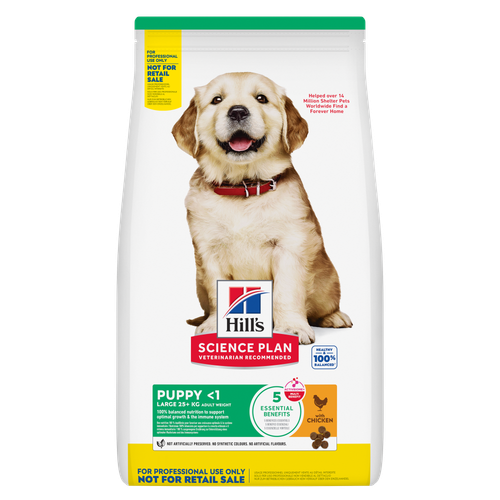
Hill's Science Plan Puppy Large Breed Dog Food with Chicken is a complete pet food, specially formulated with ActivBiome+ Multi-Benefit Technology.
100% balanced nutrition to support optimal growth & the immune system.

Hill's Science Plan Puppy Medium Breed Dog Food with Chicken is a complete pet food, specially formulated with ActivBiome+ Multi-Benefit Technology.
100% balanced nutrition to support optimal growth & the immune system.

Hill's Science Plan Puppy Small & Mini Breed Dog Food with Lamb & Rice is a complete pet food, specially formulated with ActivBiome+ Multi-Benefit Technology.
100% balanced nutrition to support optimal growth & the immune system.
Related articles

Learn about snake bites on dogs, including clinical symptoms to look for, what to do if you think your dog was bitten, and treatment & prevention options.

Puppy, kitten and pet dieting, cat nutrition and dog nutrition information from Hill's Pet

Discover the causes, signs, and treatments of kidney disease in dogs and find methods of supporting your dog's kidney health. Learn more at Hill's Pet South Africa.

Dog obesity is a significant problem - learn more about helping your dog become trimmer and healthier through improved nutrition.

Put your dog on a diet without them knowing
Our low calorie formula helps you control your dog's weight. It's packed with high-quality protein for building lean muscles, and made with purposeful ingredients for a flavorful, nutritious meal. Clinically proven antioxidants, Vitamin C+E, help promote a healthy immune system.
Put your dog on a diet without them knowing
Our low calorie formula helps you control your dog's weight. It's packed with high-quality protein for building lean muscles, and made with purposeful ingredients for a flavorful, nutritious meal. Clinically proven antioxidants, Vitamin C+E, help promote a healthy immune system.

